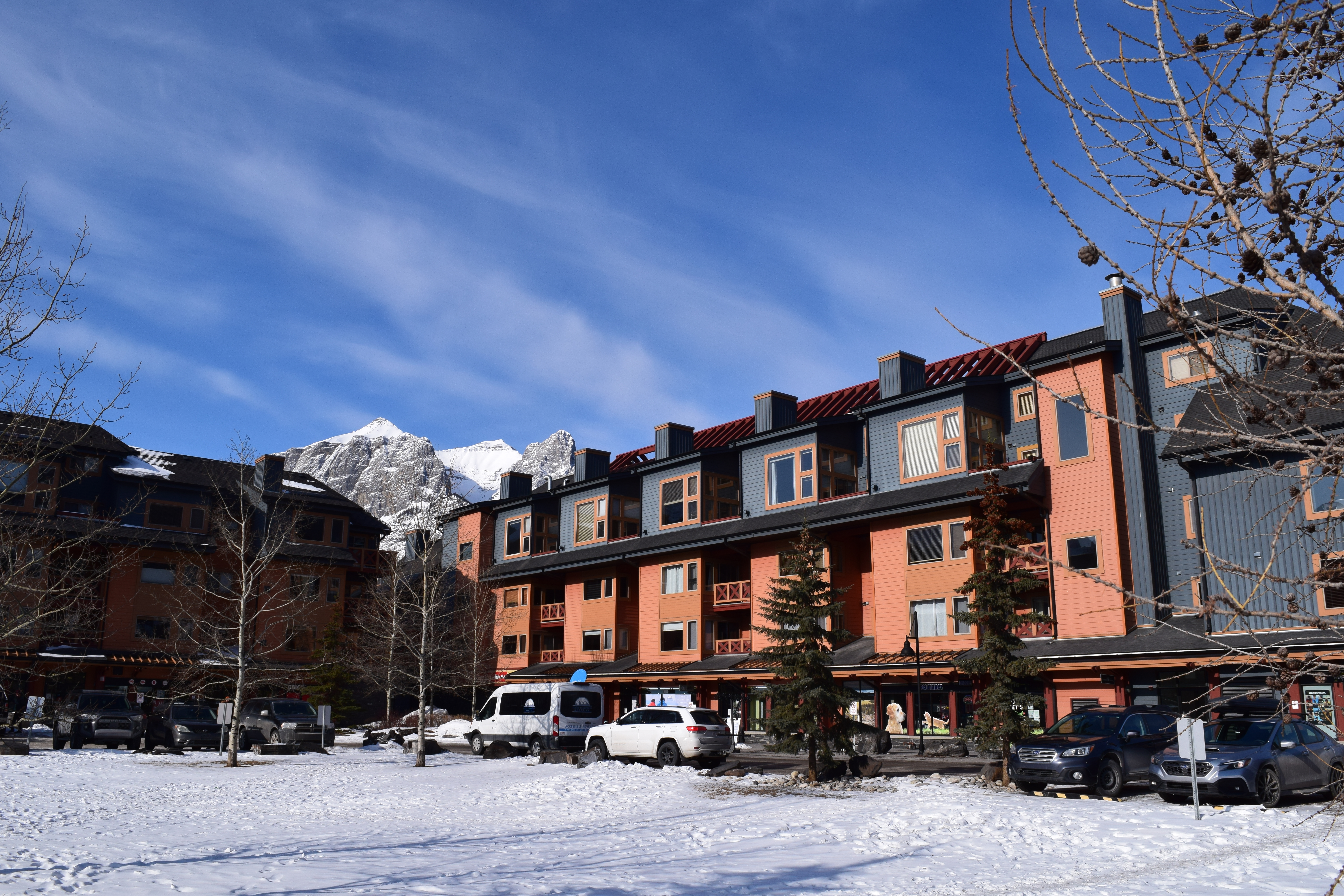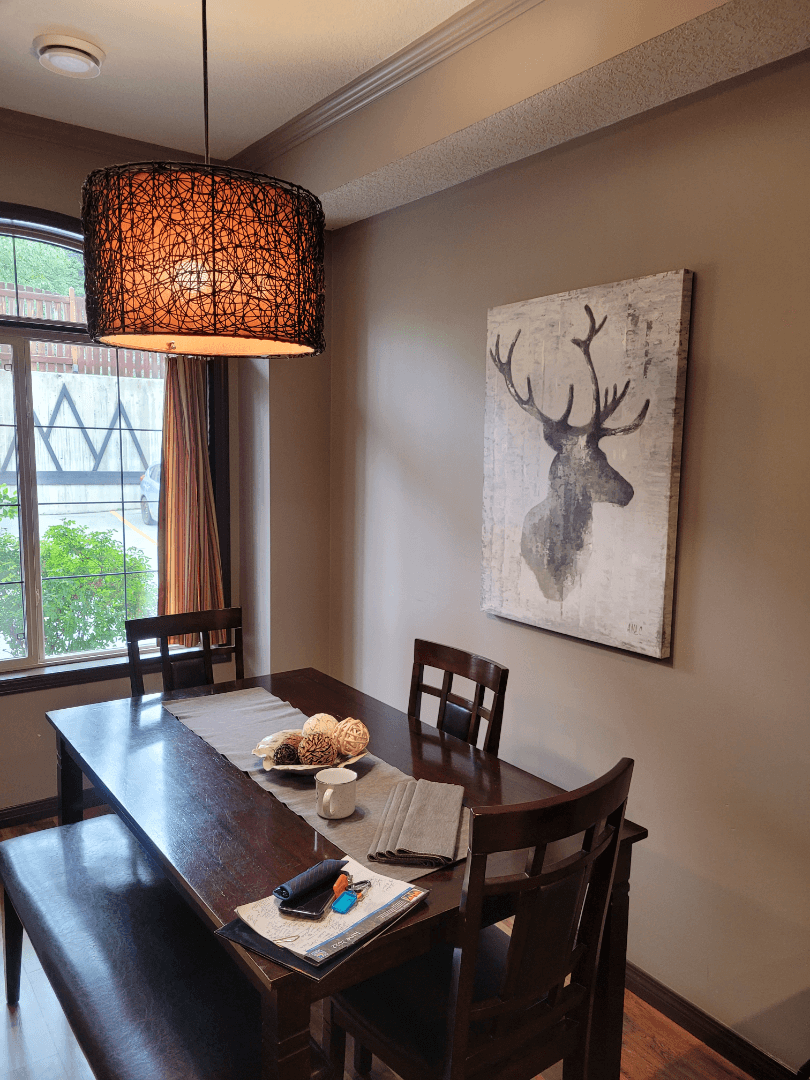Owning a property in Banff or Canmore means immersing yourself in the breathtaking beauty of the Canadian Rockies every day. Whether you’re seeking a cozy retreat, an adventurous basecamp, or a place to call home, these mountain towns offer something truly special. In Banff, living within the National Park connects you to nature in a deeply meaningful way, while Canmore offers greater flexibility and a vibrant community. With the right guidance from a local expert and a clear vision, you can turn your dream of waking up to stunning peaks and endless outdoor adventures into reality.
While many of us would love a home with lots of space and amenities, it’s important to be realistic and keep your home aspirations in line with your income.
According to the Canada Mortgage and Housing Corporation (CMHC), your monthly housing costs should not exceed more than 32% of your average before-tax monthly income. This is called your gross debt service (GDS) ratio.
You can figure out what your GDS ratio is by using this calculation: Total housing costs / Gross family income x 100
Housing costs include things like mortgage payments, heating, 50% of condo fees (if applicable), and property taxes.
Furthermore, the CMHC advises that a person’s entire monthly debt load should not exceed more than 40% of their gross monthly income. This percentage is known as your total debt service (TDS) ratio.
Figure out your TDS ratio with this calculation: (Total housing costs + other debt payments) / Gross family income x 100
In other words, your debt load includes your mortgage, property taxes, heat, 50% of any condo fees, as well as all your other debt payments, including for credit card debt or other loans.
Canadian mortgage lenders calculate and use your GDS and TDS ratios to decide if you qualify for a mortgage and what amount they will loan you. Note that there is a bit of wiggle room with what percentage lenders will accept, and you can still qualify for a mortgage even though your GDS and TDS ratios are higher than those set by the CHMC.
Keep in mind that when making an offer on your first house, it’s not just the mortgage costs and down payment that you need to consider. You’ll also have to factor in the expenses of managing a home, such as basic maintenance, utilities, property taxes and more. When it comes to home maintenance, experts say you should expect to spend anywhere from 2% to 5% of the value of your home on maintenance each year.
To buy a house in Canada, you’re required to have a minimum down payment of at least 5% of the purchase price for homes of $500,000 or less. For homes that cost more than $500,000, you will need a minimum down payment of 5% for the first $500,000 and at least 10% for the remaining portion of the purchase price. Homes that cost $1 million or more require a down payment of at least 20%, as do investment properties you don’t intend to live in.
Even if you’re not planning to buy a home for several years, there are benefits to getting a head start on your down payment savings.
Unless you have enough cash to buy a house outright, you’re going to need to secure a mortgage. In Canada, if you don’t have a down payment of at least 20% of a home’s value you’ll also have to get mortgage loan insurance through a provider such as CMHC.
The insurance protects financial institutions if home buyers default on their mortgage. Premiums are factored into your mortgage payments, so the smaller your down payment, the greater the premiums — and hence the higher your mortgage payments overall.
Starting to save for a down payment even before you have firm plans to buy your first home could mean avoiding mortgage insurance and enjoying a smaller monthly payment — not to mention more home equity.
Your credit score is a reliable indicator of your overall financial health. Potential mortgage lenders will look at your credit score when deciding whether to give you a mortgage and at what interest rate.
Knowing your score will help you decide if you should wait to buy a home and instead do what you can to build your score first. Note that for mortgage insurance the CHMC requires that the minimum credit score of at least one of the borrowers is 680.
Canadian mortgage lenders calculate and use your GDS and TDS ratios to decide if you qualify for a mortgage and what amount they will loan you. Note that there is a bit of wiggle room with what percentage lenders will accept, and you can still qualify for a mortgage even though your GDS and TDS ratios are higher than those set by the CHMC.
Keep in mind that when making an offer on your first house, it’s not just the mortgage costs and down payment that you need to consider. You’ll also have to factor in the expenses of managing a home, such as basic maintenance, utilities, property taxes and more. When it comes to home maintenance, experts say you should expect to spend anywhere from 2% to 5% of the value of your home on maintenance each year.
To qualify for a mortgage in Canada, home buyers must pass the mortgage stress test. The test was introduced in 2018 to ensure that buyers could afford to maintain their mortgage payments if interest payments were to rise.
All potential borrowers, no matter what down payment they are making, must show they can afford mortgage payments based on their contracted mortgage interest rate plus 2%, or 5.25%, whichever is higher.
So, for example, if the bank is offering you a rate of 2%, you would still have to prove you could afford to make monthly mortgage payments if interest rates rose to 5.25%.
Do you want a fixed (locked in) or variable (changeable) rate of interest? Do you prefer a closed (can’t pay a mortgage back early without penalty) or an open mortgage (can be paid off at any time)? How long of a mortgage term do you feel comfortable with? Most commonly mortgages have an ammonization period** of up to 25 years.
(**Ammonization Period: the total length of time it takes to pay off a loan—usually months or years)
It’s important to take the time to compare qualification requirements, loan options, interest rates and fees across multiple types of lenders before choosing a mortgage. You might consider the options offered by a traditional bank, a credit union and an online-only bank, for instance. Comparing lenders will help you understand your options and ensure you get a mortgage that meets your needs at a competitive price.
Getting pre-approved for a mortgage is helpful because it gives you a realistic idea of what you can afford to spend on a home. You can apply for pre-approval with several lenders to compare their offers; getting pre-approved does not hold you to a specific lender.
When you buy a home, you have to pay for upfront costs in addition to your mortgage. These are called closing costs. You can expect to spend between 1.5% and 4% of the home’s purchase price on closing costs. You usually pay these costs by the time the sale is completed or “closes”.
Generally, if you buy a new build home, you pay GST or HST. Some builders include the HST in their sale price while others don’t. Make sure to check. Otherwise, you have to pay this cost upfront on closing day.

Condominiums, or condos, are shared properties that contain individual housing units. Each unit has its own owner. Owners share the common areas outside of the unit such as the lobby and parking lot.
There are pros and cons to owning a condo. For example, if you buy a condo, you pay monthly condo fees. However, you may like the idea of sharing the building maintenance costs with the other unit owners.

You can buy a property with the intention of renting it out. Keep in mind that you have to declare your rental income at tax time each year.
Buying to rent can be a great way to save for the future. Keep in mind, if you are thinking about buying to rent think about what kind of rental property you want. Will it be for long-term tenants (30 days or more) or will you want to have short-term rentals (28 days or less) and use websites like Airbnb and VRBO to advertise them.
Other costs you may need to budget for include:

Mortgage lenders may ask you to have an appraisal done as part of the mortgage approval process.
An appraiser provides a professional opinion about the market value of the home you want to buy. An appraisal fee is generally between $350 and $500.
An inspector provides a comprehensive visual inspection of a home’s overall structure, major systems and components such as:
Electrical and plumbing systems
Heating and cooling systems
The foundation
The roof
The exterior
CMHC recommends that you include a home inspection as a condition when you make an offer. A home inspection usually costs between $350 and $500.
You have to pay legal fees on your closing day. This is the day that your home purchase is complete. These fees are usually range between $400 to $2,500 but will vary depending on your lawyer’s or notary’s rates.
A lawyer or notary can help protect your legal interests. They make sure that the home you want to buy does not have a lien against it. A lien is a legal claim over another person’s property that someone files to ensure a debt gets paid.
A lawyer or notary reviews all contracts before you sign them. They also review your offer or agreement to purchase.
Before moving in, you may also have to pay for:
moving costs
storage costs
real estate costs for selling your home (if applicable)
redirecting mail
Once you move in, you may immediately face other costs, including:
utility hook-up fees
basic furniture and appliances
painting and cleaning
water tests
septic tank tests (if applicable)
Closing costs may include:
Interest adjustments (period between your purchase date and your first mortgage payment)
Certificate of Location cost
Estoppel certificate (for condominium units)
Township or municipal levies (may apply to new homes in subdivisions)
Mortgage default insurance premium (if paying premium up front instead of adding it to mortgage loan)
Provincial sales tax on premiums for mortgage default insurance (applicable in some provinces)